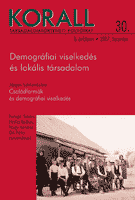Vendégmunka és csempészet a 19. században Kihágások a magyar–román határ Háromszék és Brassó vármegyei szakaszán az 1880-as években
Guest Work and Smuggling in the Nineteenth Century Off ences on the Hungarian-Romanian Border in Háromszék and Brassó Counties in the 1880s
Author(s): Botond NagySubject(s): History
Published by: KORALL Társadalomtörténeti Egyesület
Summary/Abstract: Compared to its earlier state, the border between the new sovereign state of Romania and the Austro-Hungarian Monarchy in the second half of the nineteenth century solidifi ed considerably. Such a borderline is the most important attribute of a modern nation-state. Its basic functions are to provide a framework to the development of national industry and economy, to control migration, to stop the spread of epidemics and last, but not least, to curb ideas that might jeopardise the integrity of the state. The change from borderland into borderline is not an organic process. Between the border regions of these two countries – mainly due to environmental, and, not inconsiderably, to various economic and social factors – mutual dependency had developed in the course of the previous centuries, where the primary actors were the inhabitants of the region. The majority of the inhabitants pursued special activities and lifestyle, which necessitated their unobstructed transfer from one region to another. The diff erent directions the two countries’ economic development assumed increased the interdependency between the border regions, and intensifi ed the movement of people and goods. However, the new development allowed narrower and more restricted mobility compared to the earlier practices of border crossing. This study aims to identify individuals who strove to bypass this restricted mobility in some ways. Infringements were both common and constant practice, and the relations between the two countries generated peak seasons for these several times within a decade. From the cases of petty off ences and infringements registered by the authorities one may infer the nature of the lifestyle characteristic in this region and the subsequently developing networks of connections and people.
Journal: Korall - Társadalomtörténeti folyóirat
- Issue Year: 2007
- Issue No: 30
- Page Range: 182-203
- Page Count: 22
- Language: Hungarian

